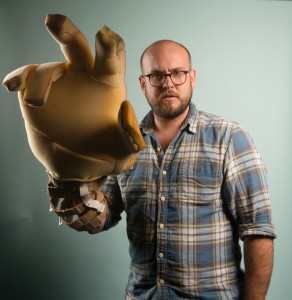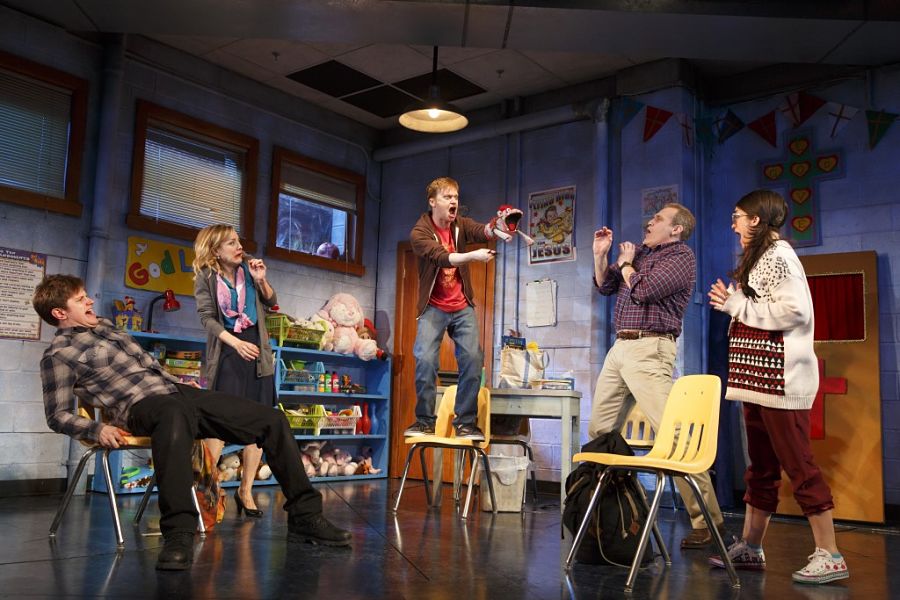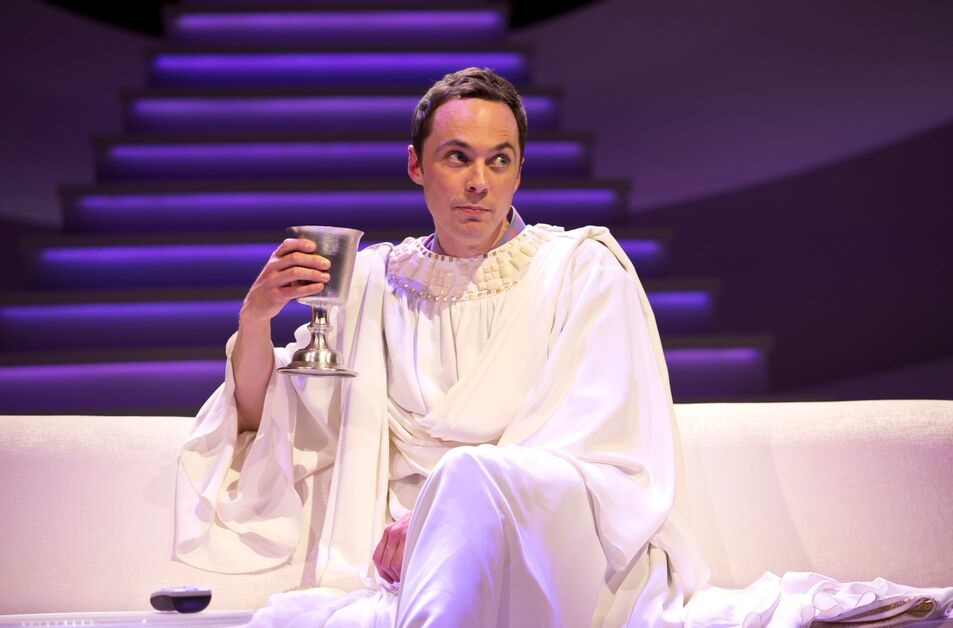NEW YORK CITY: Robert Askins and David Javerbaum have been confused with each other a bit lately. You can blame it on God—or more precisely, on the Almighty’s name being prominent in the titles of both their currently running Broadway shows.
“‘Hand to God with Jim Parsons’ is something I get a lot,” Askins said, noting that his play about a demonic sock puppet overtaking a youth puppet ministry, titled Hand to God, is easy to mistake for Javerbaum’s An Act of God, a comedy starring Parsons in the title role.
“They both end with God and have the same number of syllables, if you don’t count the ‘an,’ Javerbaum said. “But I’m happy about it, because his show is apparently wonderful. It’s a mutual-admiration thing.”
Askins’s Hand to God began its journey in 2011 at Ensemble Studio Theatre, where he was a member of the company’s Youngblood program for playwrights under 30. The play then transferred to MCC Theater in 2014, then opened on Broadway in April, earning five Tony Award nominations, including best play.
Javerbaum’s path to the stage is slightly different. A writer for “The Daily Show” for 11 years, and currently producer of “The Late Late Show With James Corden,” Javerbaum started the Twitter account @TheTweetofGod to promote a satirical book he was writing, The Last Testament: A Memoir by God. The Twitter account took off, and when producers took interest in Javerbaum’s irreverent spin on much of the more contentious elements of the Bible, An Act of God, now running through Aug. 2 at Studio 54, became the first Broadway play based on a Twitter feed.
“It’s an interesting and delicious coincidence that both shows are arriving roughly at the same time with similar titles and similar concerns about religion,” Javerbaum said.
Indeed, the plays’ similarities extend beyond the meter of the titles. American Theatre sat down with Askins and Javerbaum to discuss comedy, religion, and what God would think of their plays.
How did your own religious backgrounds affect the writing of your plays?

Robert Askins: I grew up heavily involved in the church. I started as the choir boy. Mostly because in the Lutheran church, the services were very dour—especially in the Missouri Synod, the only time there was any joy in the service was when people started to sing—I was like, “I want to get on that side, the fun stuff.” So I started doing that. As a theatrically inclined individual, there were other outlets. So then it was the puppet ministry that my mother ran. And then, as I got older, I started to preach a little bit, sort of in youth groups. And it became very clear that the things I was not allowed to say in family situations, I could say at the pulpit. I was very frustrated when I was younger because—just on a purely theatrical level—the preachers were absolute shit. They didn’t know how to work the room; they didn’t know how to do the job. So when it was my turn, I was like, “All right, let’s do some shit.”
But then, of course, the dogma got in the way as I got older. I was like, “I’m not interested in telling these people how to live their lives, but I am interested in continuing the experiment of what do we do when we get together in groups.” What do we do when we get together in groups and sing and talk about virtue? That seems to be valuable. And instead of pursing it in the religious arena, I decided to pursue it in the theatrical world.
 David Javerbaum: I have feelings about religion, certainly. I’m from a Jewish background, but I’m certainly not a particular believer at the moment. For me, the appeal of the God thing was always just that there’s just so much in the Old Testament, and the New Testament fixed it. That just seemed like funny stuff to approach comedically, and to adopt the voice of God is to have an excuse to comment on anything you want to. So it was mainly for me a means of doing what I wanted to do, which is just to make wise-ass remarks about a whole bunch of different things.
David Javerbaum: I have feelings about religion, certainly. I’m from a Jewish background, but I’m certainly not a particular believer at the moment. For me, the appeal of the God thing was always just that there’s just so much in the Old Testament, and the New Testament fixed it. That just seemed like funny stuff to approach comedically, and to adopt the voice of God is to have an excuse to comment on anything you want to. So it was mainly for me a means of doing what I wanted to do, which is just to make wise-ass remarks about a whole bunch of different things.
Do either of you see your plays as being harshly critical of religion, or do you intend them more as parodies?
Askins: I’m very interested in people trying to do right within these belief systems. I think the gap between wanting to do good and the ability to do good is funny. I think that’s where a lot of our comedy comes from. It’s hard to be human, and it’s impossible to do the right thing. We fall down more often than we stand up straight, but we keep trying. And I think that the religious aspect of it is not secondary, but it is not the primary focus [of the play]. The primary focus is the people inside bodies in the time and space are trying to do the right thing.
Javerbaum: I think, with Christianity, the central discrepancy—which is noted by everybody—is between what Jesus seems to have preached and the way people actually practice it. That’s not a unique subject to me or to anybody. In the case of the Old Testament, what’s interesting to me is that today, people are going to go to war to say, This is what happened. So for me, it was just funny to think, well, if everything the Old Testament actually happened, more or less, I’d like to hear God explain.
Many people think of theatre as a kind of religious experience. Why do you think the stage was the right place to explore these ideas?
Askins: We begin around a campfire knocking rocks together and singing and telling stories, right? And somebody’s so good at it that they make everybody feel something they never felt before. Somebody decides to call that God, right? And then they use that to say, “Oh, well, now that we’ve got this feeling everybody really likes, you should do these things.” They use that turnaround to get a little bit of power. But in the end—or the beginning—it’s knocking rocks together. It’s singing. When we have the distance of a novel, the novel is placing somebody else’s inner monologue; it’s a completely different experience of the body. And the same thing when you’re watching a screen. You’re not preoccupied with bodies in the room with you. You can’t smell their fear. You can’t sense two bodies’ attraction to each other—the editor does that for you in editing the movie. So this is as close as we get to the formation of our civilization and our primary texts. It is an almost anthropological thing we do every time we try to put on a play.
Javerbaum: Yeah, it’s a communal experience. It has been since ancient Greece and earlier, and I always find it interesting that invariably who goes to the theatre or works backstage at a theatre speaks about a particular night’s audience. And it’s amazing how you have a thousand people and they form this one entity that is “the audience.” It’s not the sum of the parts of the audience; it’s this separate communal intelligence. It’s a mystical kind of experience. I’m not talking about my show, but all theatre. It’s very comparable to going to a church or a service. I think the problem for a lot of people these days is that a church service, for whatever reason, just no longer does the sort of mystical communion job that it once did. Theatre can still do that.
Theatre audiences—this might be a broad statement—are pretty secular.
Javerbaum: I’m sure that’s true. There’s no question that high-paying Broadway audiences skew less religious, certainly much gayer, and all those things.
So what’s it like to present a show with religious themes to a secular audience every night?
Javerbaum: The purpose is not to confront a bunch of very strong believers, Christians and Jews, and say, “Ha, you’re wrong!” I wouldn’t want to do that anyway, and you know going in that’s not your audience. So it’s actually more of an attempt to make them laugh, make them think a little bit more, rather than blithely say, “This whole thing is ridiculous.” The best example is, of course, The Book of Mormon, which was written by some very hardcore atheists who went out of their way to be as fair as they possibly could and to understand, not just to say, “Religion is stupid and it’s dumb and projected completely,” but to really understand what it is about religion that fulfills a human need, and what is it about it that is good? And which things can be salvaged. That’s why that show has such a universal audience.

Askins: I think it’s interesting the notion of, What can be salvaged? I think that one of the things that we forget is that these things become monolithic entities—like the Catholic Church, the organized churches that have such huge sway and weight. At the end of it, it’s just us. We get together in a room and somebody says something, and we get to decide whether or not it’s right and wrong. If the church wants to accept gay people tomorrow, it can. The God that we generate is a group virtue spirit. And there is no reason, other than our own hatred, to propagate the hatreds of the past. (Sorry, I got a little intense there.) So, if the proverb remains, humans trying to be good in time and space, the audience will respond no matter what their background. Also, the puppet gives us fucking rope. Right?
Javerbaum: Jim Parsons gives me endless rope.
Askins: There’s a camp value to what we’re doing that gives us a lot of leeway with a lot of these communities.
Javerbaum: I totally agree with what you’re saying on a personal level. But I also know that there are many millions of people who don’t feel that way—who believe that God is not a group construct, that God is an external reality and really exists and really is a thing.
Askins: Sure.
Javerbaum: That’s not how I feel, obviously. But there are many people who do. It’s amazing to me that this low-hanging fruit is still available for the ordinary comedy writer like myself to snatch.
You brought up The Book of Mormon. Rob, some of your marketing materials call your show “The Book of Mormon meets Avenue Q.”
Askins: I’ve seen neither show.
Javerbaum: “Book of Mormon meets Avenue Q” means if you like Bobby Lopez, you should watch this show.
The thing that’s interesting about both of your shows is they’re both plays. Religion and comedy have been explored a lot in musicals, but there aren’t a lot of non-musical comedies about religion.
Javerbaum: I went to grad school to write musicals, so I always thought that if I had a big success on Broadway, it would be in the musical realm. But even though this is not a musical, there is certainly a great deal of musicality when you write comedy, especially when it’s essentially a long monologue. It’s all about rhythm. It’s all about emphasis. It’s incredibly musical. You’re dealing with little micro-beats, essentially little micro-monologues that could be a song in a musical. So it’s a very musical structure.
Askins: I couldn’t agree with you more. Comedy is all music. It elicits a response in a way that music does as well. I also think that what the musicality of it does is relieves anxiety. We have a lot of tragedies about religion—from Doubt to Agnes of God to Equus—and I think this moving first to a musical space and then now to a straight-play comedy place is a lot about the movement of the way that we’re thinking about it. Because we’re no longer pointing at it and saying, “Well, this cult is all anxiety and neurosis.” The project is now, “God is dead. Let’s do the autopsy and find out what we can gain from the dead beating heart.” You know what I mean? I think that the music of the language allows you to look at the thing that’s hard to look at. You’re relieved in some way by the laughter.
David, you have God in your show in the form of Jim Parsons—you say in the play that God has inhabited Jim Parsons for the night. And Rob, you have the devil in your show in the form of a puppet. I know you’ve just said you’re nonbelievers, but do either of you believe that somehow entities can inhabit other beings? Is there something mystical going on, or is it just something that works for dramatic effect?
Javerbaum: I don’t discount the possibility—in fact, I endorse the possibility that there’s something bigger than any of us could understand. If there is something there—whatever you call God—to me personally, yeah, he’s in me, he’s in everything. He would have to be.
Askins: Just moreso in Jim Parsons.
Javerbaum: Moreso in Jim Parsons, eight times a week onstage. The premise of the show is that God inhabits Jim Parsons. And if down the road, God were to inhabit some other actor for 90 minutes—he could do that in London. He could do that in Sydney if he wanted to. God is omnipresent. So he can show up anywhere and be anybody and be anything.
What about you, Rob? Is Tyrone the devil or is the devil in Tyrone?
Askins: Man, that’s one of my favorite questions not to answer. One of the things the play tries to get at is that there is this thing that takes us over, and the vocabulary for it has changed throughout history. A lot of the things we used to call “the devil” we now call psychosis. And in 100 years or 200 years, we will call them something else. Whatever that darkness is, we will continue to rename it in an attempt that just a vocabulary change will fix it. And it’s not going to fix it.
Have either of you spoken with audience members after a show? Do you enjoy it?
Askins: Yeah, I have absolutely no problem with it. Actually, I have an easier time talking with the people that don’t like it than the people that do, ’cause we have some point of contention to build a relationship around
Javerbaum: I haven’t, but I don’t anticipate there being a lot of controversy. At one point I was joking that I wanted to fly in the Westboro Baptist Church to protest outside. They could stand outside and burn copies of my book as long as they paid full price for the book, and that I would also sell them the kerosene. I would be totally fine with that. Because it’s a win-win. They get to be angry, and I get to sell tickets.
If you could have asked God any questions during your writing process, what would they be?
Javerbaum: I just really tried to put myself in his mind, which to some people might sound like an incredibly egotistical thing. It’s not to me—he’s just a character. I would just try to think, like, “What would God say that would be funny?” But funny in a way that rings true and is not just random. Like, what does God think about people killing people in his name? Well, the easy thing would be to say, “I’m against it and you shouldn’t be killing people in my name.” But that’s too easy, and I don’t think that’s true! So I tried to think of a more interesting response, and that is, “Don’t kill in my name—not because I’m against it; it actually means a lot to me. But it’s patronizing. I can do it by myself. I’m killing two people every second, as we speak.” That’s a more interesting way to go than just to say the opposite of what we’re told.
What about you, Rob? Any questions for God?
Askins: I don’t know. I don’t drink anymore. And I’m not angry and in high school. That kid would have screamed a lot of things at God. But I’m not interested in that anymore.


